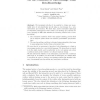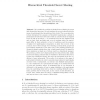170
click to vote
TCC
15 years 7 months ago
2004 Springer
Abstract. We investigate whether it is possible to obtain any meaningful type of zero-knowledge proofs using a one-message (i.e., noninteractive) proof system. We show that, under ...
149
click to vote
TCC
15 years 7 months ago
2004 Springer
We explore the notion of a pseudo-free group, first introduced by Hohenberger [Hoh03], and provide an alternative stronger definition. We show that if Z∗ n is a pseudo-free abe...
140
click to vote
TCC
15 years 7 months ago
2004 Springer
We consider the problem of threshold secret sharing in groups with hierarchical structure. In such settings, the secret is shared among a group of participants that is partitioned ...
131
Voted
TCC
15 years 7 months ago
2004 Springer
Abstract. We present a general method to prove security properties of cryptographic protocols against active adversaries, when the messages exchanged by the honest parties are arbi...
129
click to vote
TCC
15 years 7 months ago
2004 Springer
Quantum 2-party cryptography differs from its classical counterpart in at least one important way: Given blak-box access to a perfect commitment scheme there exists a secure 1−2...
|
Cryptology


